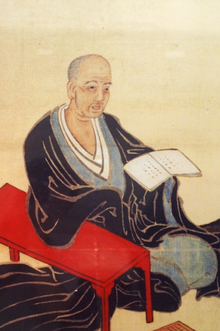Honinbo Dosaku
| Hon'inbō Dōsaku | |
|---|---|
 |
|
| Full name | Hon'inbō Dōsaku |
| Kanji | 本因坊道策 |
| Born | 1645 Japan |
| Died | 1702 Japan |
| Teacher | Hon'inbō Dōetsu |
| Rank | 9 dan |
Hon'inbō Dōsaku (本因坊道策, 1645–1702) was a professional Go player.
Dōsaku was one of the greatest Go players in history. He was born in the Iwami Province of Japan and studied Go in the Hon'inbō school, becoming Meijin at a very young age.
Dōsaku was the fourth Hon'inbō by the time he was 32, and the fourth Meijin by the time he was 33. He started to learn Go at 7. Dōsaku was so strong by the time he was in his early 20's that even if someone played the first move, he would always win. Rumors were that he was two stones stronger than any other Go player. This was due to his deep thinking and next-level tactics. He laid the foundation for opening strategy in the Golden Period.
Only a short time after receiving the Head of the Hon'inbō school he was given the post of Meijin in recognition of his unrivaled strength. On one account, this controversial appointment (which deprived Yasui Sanchi of his official positions) was handled by the Jisha-bugyō by summoning a meeting of all concerned parties, including the shogidokoro Ōhashi Sōkei. Sanchi did not attend, and the change of Meijin-godokoro was agreed on unanimously. The ground for this decision was the match of 20 games played between Hon'inbō Dōetsu and Sanchi, for which Dōsaku probably acted as Dōetsu's second on adjournments.
By the time he was 32, he was already head of the Hon'inbō school and placed at the top of the official hierarchy. It has been suggested that the true level of his playing strength was never really tested, given the distance between him and his nearest rivals. The evidence of his contributions is in the legacy of games, known to us by the kifu records.
Two of his famous games are the Jan. 5th, 1684 defeat by one point in a two-stone game (his "life-time masterpiece") and the 1670 castle go game when his opponent opened at tengen, the central point, which was a victory. These were both against members of the Yasui house. Over 150 games of his are known.
...
Wikipedia
